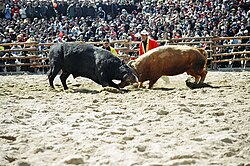Cheongdo
|
Cheongdo 청도군 |
||
|---|---|---|
| County | ||
| Korean transcription(s) | ||
| • Hangul | ||
| • Hanja | ||
| • Revised Romanization | Cheongdo-gun | |
| • McCune-Reischauer | Ch'ŏngdo-gun | |

The Cheongdo county is famous for the annual bullfighting festival
|
||
|
||
 Location in South Korea |
||
| Country |
|
|
| Region | Yeongnam | |
| Administrative divisions | 2 eup, 7 myeon | |
| Area | ||
| • Total | 696.53 km2 (268.93 sq mi) | |
| Population (2005) | ||
| • Total | 47,099 | |
| • Density | 72.8/km2 (189/sq mi) | |
| • Dialect | Gyeongsang | |
Cheongdo County (Cheongdo-gun) is a county in North Gyeongsang Province, South Korea. It is connected to the national transportation grid by the Gyeongbu Line railroad and the Daegu-Busan Expressway. The seat of government is located in the center of the county, in Hwayang-eup.
In the Samhan period, Cheongdo may have been the site of the small polity of Ieso-guk. It was later absorbed into Silla, and gained its current name of "Cheongdo" in 940. The county's nine subdivisions were established in 1919. The county government moved to its current location in 1961. In 1966, the New Village Movement began in Sindo 1-ri, Cheongdo-eup.
Every year Cheongdo is host to an international bullfighting festival.
Cheongdo is divided into two eup and seven myeon, as below. These in turn are divided into 212 ri, and 668 natural villages (jayeon burak).
Cheongdo is twinned with:
Coordinates: 35°38′50″N 128°44′03″E / 35.647253°N 128.734088°E
...
Wikipedia

